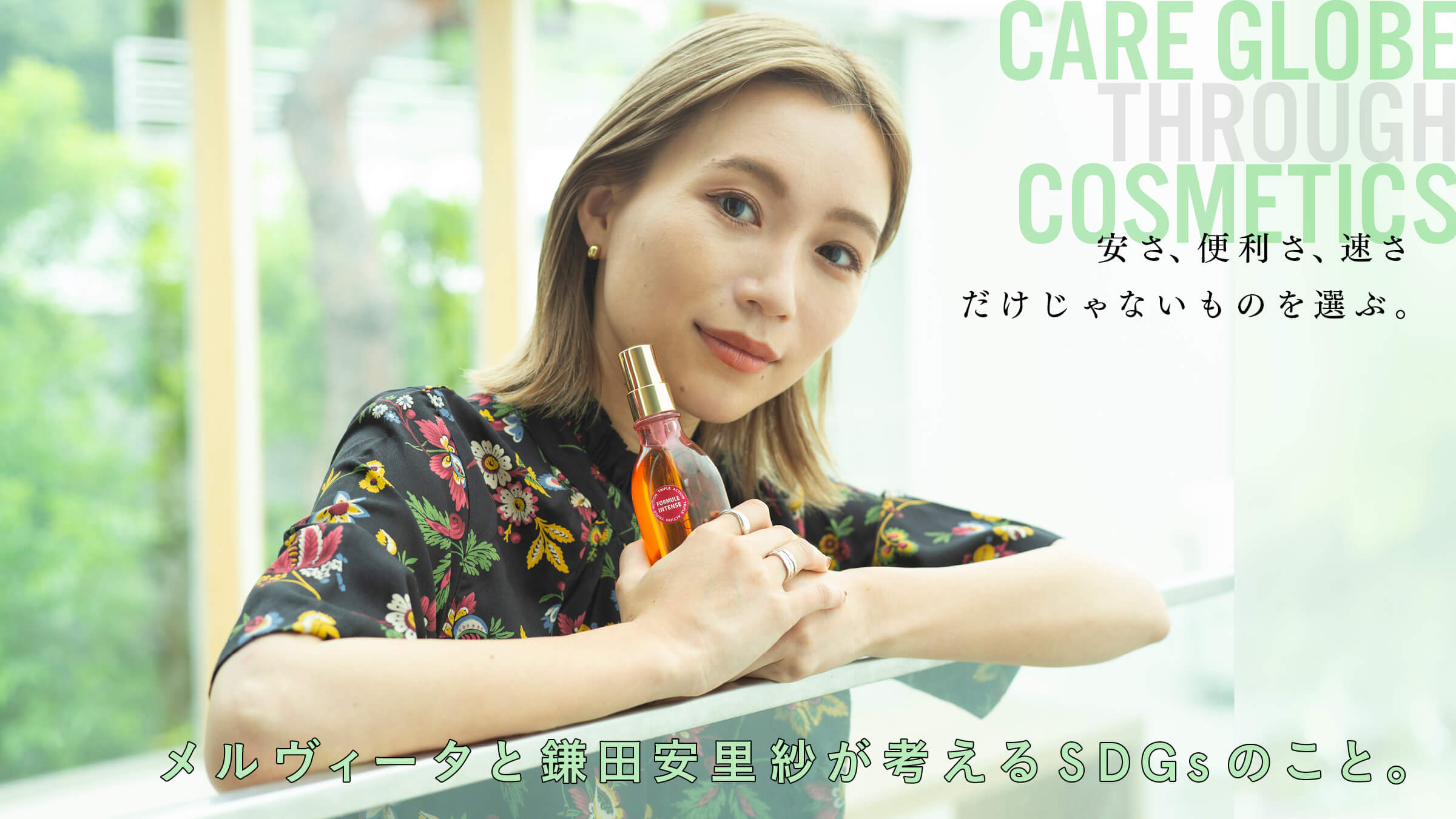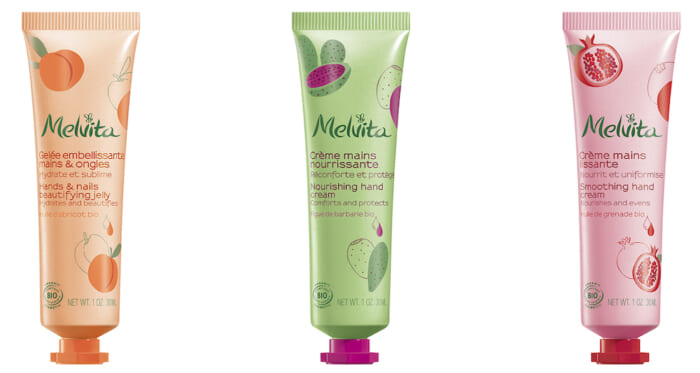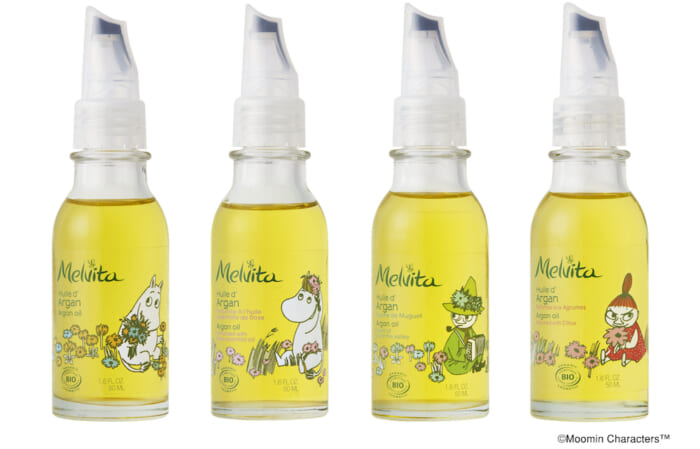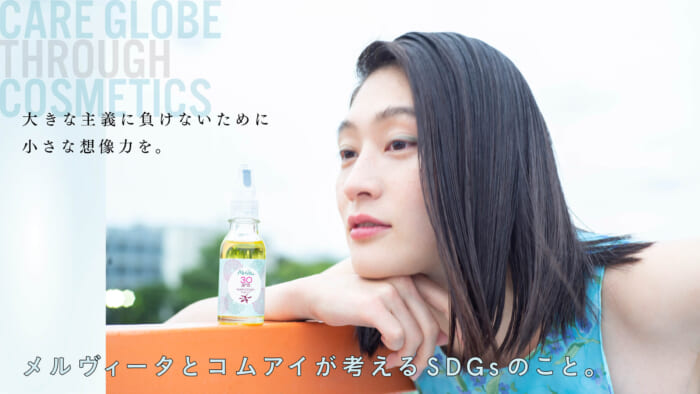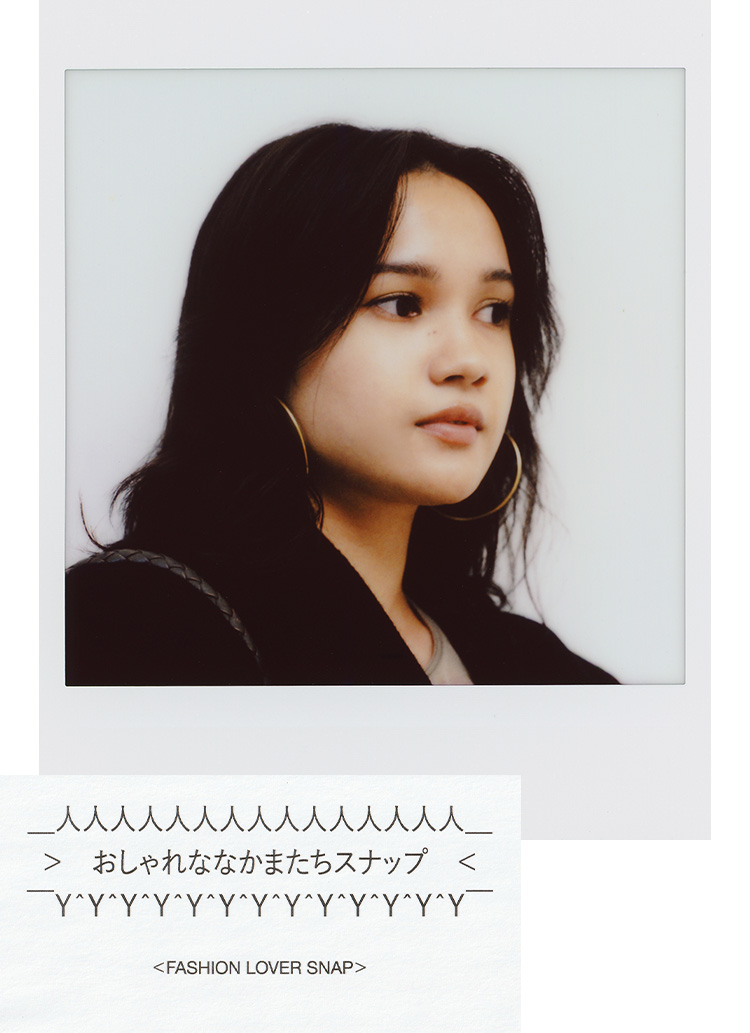Perhaps it would be better to rethink our rushed lives.
Do you choose cosmetics from an SDG perspective?
Kamata: I do care about whether a company has that kind of idea. But choosing cosmetics is really difficult. It is difficult to determine what ingredients are used and why, and whether they are suitable for you. Therefore, rather than just stating that our cosmetics are good for the environment, I prefer a company that clearly states its stance that it uses such ingredients for such and such reasons. If there are any concerns about the use of the ingredients, it is more trustworthy if they mention such concerns and honestly state their stance on the matter.
Melvita considers sustainability from various perspectives and angles, including the environment and workers in the production background, so we have a dilemma of having to give lengthy explanations.
Kamata: Certainly, there are those who prefer simplicity and clarity. But in the end, it is a question of how many people are seriously considering choosing a particular one, and how important it is to them. Personally, I prefer detailed explanations of the SDGs rather than vague assertions that the company is committed to the SDGs.

I think it may be because of your basic stance of not jumping to answers that someone else has given you. This is a bit of a long explanation (laughs), but Melvita places importance on four major things. First, the cosmetics must be effective. Second is ease of use. For example, cosmetics should be pleasant to use without being sticky. Third is economic efficiency. No matter how good the product is, it is meaningless if it cannot be used every day. The fourth is sustainability. From development to production and distribution, the product must be as cost-effective as possible for both people and the earth. For example, both the body oil and sunscreen are made from 100% natural ingredients, and we are trying to minimize the burden on the environment as much as possible.
Kamata: I was once told by a detergent manufacturer that none of the detergents currently on the market in Japan are that hard on water. From his point of view, claiming high biodegradability is just marketing. When we hear such things, we amateurs are at a loss as to what we should base our choices on (laughs). (Laughs.) What is your view on biodegradability? What is your perspective on avoiding petroleum-derived ingredients?

Last year, the use of silicone, a petroleum-derived ingredient, became more regulated in Europe. Generally, silicones are used in creams and other products because of their smooth and silky feel, but it is said that they take more than 400 years to biodegrade.
Kamata: I see. I have heard comments from people in the beauty industry that silicones are excessively demonized, but from a biodegradability standpoint, it is definitely true that they have a high environmental impact.
Yes, that's right.
Kamata: It's easy to get confused because there are so many different perspectives on the benefits to the skin and hair, the impact on the natural environment, and the cosmetic aspects.
Yes, I know. For example, this sunscreen is 100 percent naturally derived to protect the marine environment. Among other things, this sunscreen does not use UV absorbers to protect coral. This product is 100 percent naturally derived, which is good for the coral and the environment. However, it is not certified organic in Europe. The reason is that the minerals are made into nanoparticles so that they don't turn white when applied, which is not good. This is because it is said that research is still needed to determine how much impact nanoparticles have on the environment and people.
Kamata: I see. It takes time to understand how new technologies affect the environment and people. Personally, I would like to make a decision after knowing information such as the reason why organic certification has not been obtained.


Melvita basically imposes various conditions on the production of raw materials. For example, the production must be at least several kilometers away from the city, or the land must be free from chemicals for at least three years, and so on.
Kamata: Why leave the city?
I don't want the air to be polluted.
Kamata: It is a bit ironic to think that people living in such a city would also use the product (laughs).
(laughs). That's true. It was interesting that Mr. Kamata mentioned earlier that cotton clothes are originally made from small seeds.
Kamata: While cotton in general requires large amounts of pesticides and water, organic cotton accounts for a very small percentage of the total. It is currently unrealistic to expect all cotton products to be organic cotton, and it is said that cotton products will become scarce in the future due to climate change and costs in the first place. What I think about when I hear these things is that it is the same for cosmetics, but first we need to reduce overall production.
It's not a treatment for the symptoms, but a treatment for the cause. Mr. Kamada, you are also well versed in the background of cosmetics production, aren't you?
Kamata: I have often discussed cosmetics with various people. However, it is not so much that it is difficult, but rather that it is interesting to talk with people from various perspectives. There are those who emphasize functionality, and there are those who say that non-silicone products are unthinkable. After listening to various people's stances, I can finally come up with my own. For example, what they are interested in, what they are not interested in, and what their priorities are.

It is certainly important to know, or rather to try to know.
Kamata: It is interesting to know the background and information behind the various things that are made in our daily lives. I think it is a waste to just casually wear something, eat something, and live somewhat....
That may also be reflected in the selection of goods.
Kamata: When we choose things, we want to know that there are other perspectives besides speed, price, and convenience. For example, it is important to know that biodegradability and environmental impact can also be considered. It is only natural that the choice of what to choose will vary from person to person.
Cosmetics are something we use in our daily lives, so it may be important to choose the things around us with a proper perspective. In that sense, this story may be connected to the importance of choosing clothes.
Kamata: I think there are environmental issues beyond commodities. It may be difficult to suddenly become familiar with everything, but I would like to realize that everyone is part of the problem and part of the solution, not just a limited number of people working on environmental issues.

I think that the SDGs are becoming more and more important these days, and that it is possible to get information about them if you look for it.
Kamata: It's an easy situation to ask. In the past, I might have been perceived as a complainer (laughs). I often send an e-mail from the contact information on the website and ask to speak with the company, and sometimes I get to know them well through that. Some people worry that asking questions about the environment or other production backgrounds might be perceived as aggressive, but when I ask questions, we often become more intimate or, conversely, we become friends. It is not just an inorganic buying process of looking at the prices and functions offered, comparing them with others, and then deciding whether or not to buy them. Of course, we have to be careful not to take up too much of the time of the person who is being asked to listen. By doing so, the uniformity of purchases can be distorted in a good way.
I think thinking about the SDGs requires a certain amount of time, both mentally and physically. You must be busy with various activities, but is there anything that you are conscious of so that you don't get overwhelmed?
Kamata: We are swallowed up by busyness (laughs). (Laughs.) But, for example, in our busy lives, there is a sense of justice in shortening the time for each and every thing, but is it really a good idea to shorten the time in the first place? I think so. Rather, it might be better to reconsider a life that is too rushed, and I would like to be aware of what the shortening of time is for. For example, we may feel that work-related questions must be resolved immediately, but questions about our lives may be answered when we have time again, or we may put more emphasis on work than on our lives. For example, when I have to answer a question about my work, I may think I have to do it right away, but I may ask a question about my daily life when I have time to do it again. Of course, when you are passionate about your work, you may forget to eat or sleep and become absorbed in it, but I think it is important to express the value of not neglecting your life.

Right:L'orloze Activate Body Oil
A body care oil that tightens the skin. It cares for the areas of the body that are bothering you and tightens the skin, while rose hip oil and sea buckthorn oil lead to a supple body full of moisture. Spray type, easy to use, and pleasantly refreshing scent of spicy citrus. ¥5,500
Left:Nectar Blanc UV Shield SPF35 PA+++.
UV protection is essential for the coming season. This UV shield has a smooth, non-greasy texture that protects the skin from UV rays while also providing beauty benefits. It is environmentally friendly as it does not contain UV absorbing agents or synthetic surfactants. It can also be used on beaches in Hawaii and Palau, both of which focus on protecting the marine environment. ¥4,840
- 1
- 2


